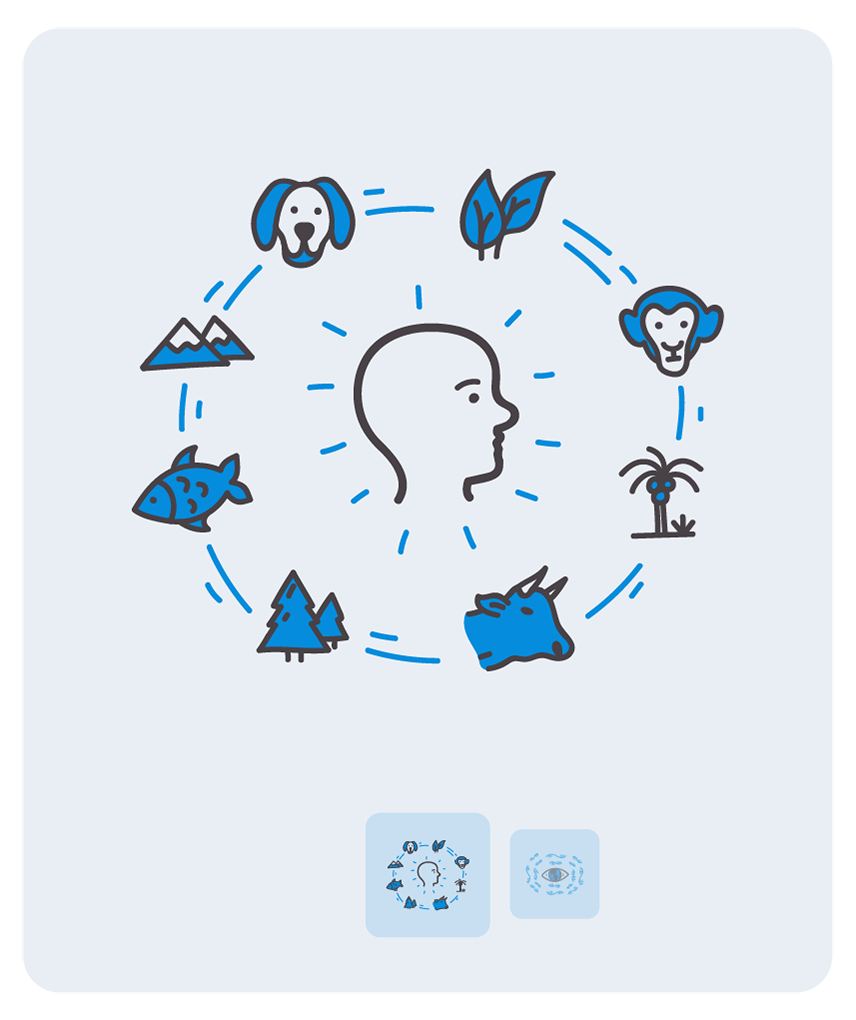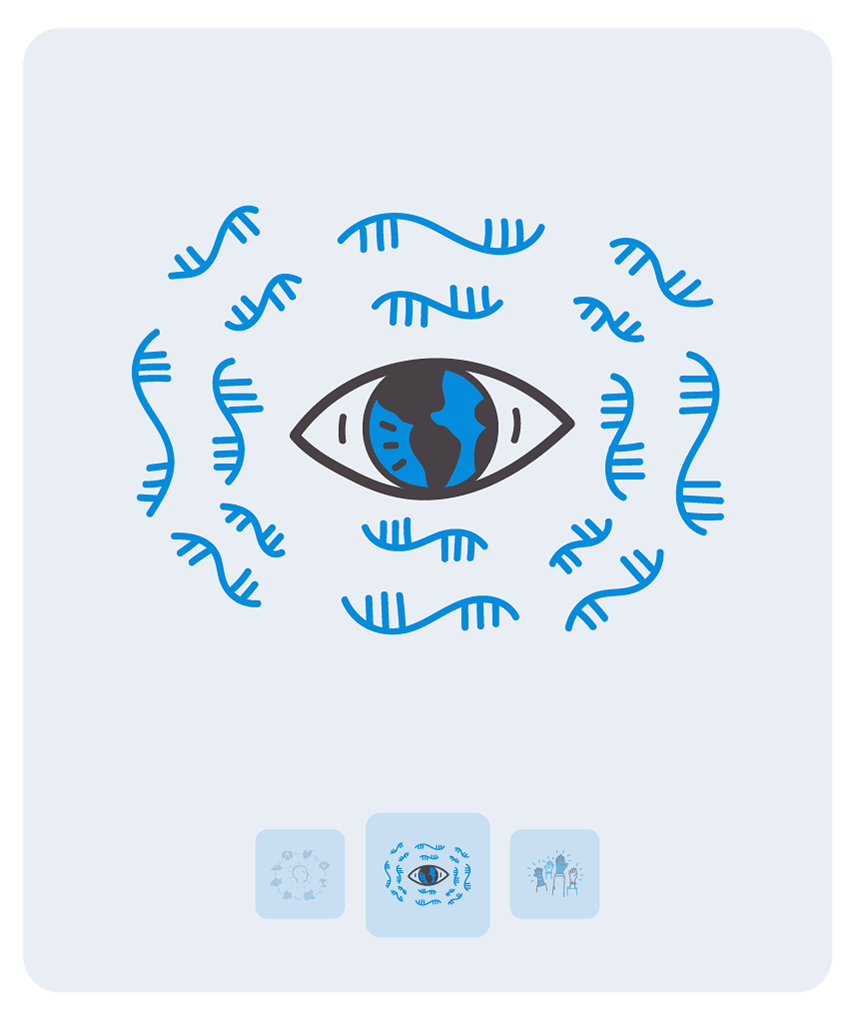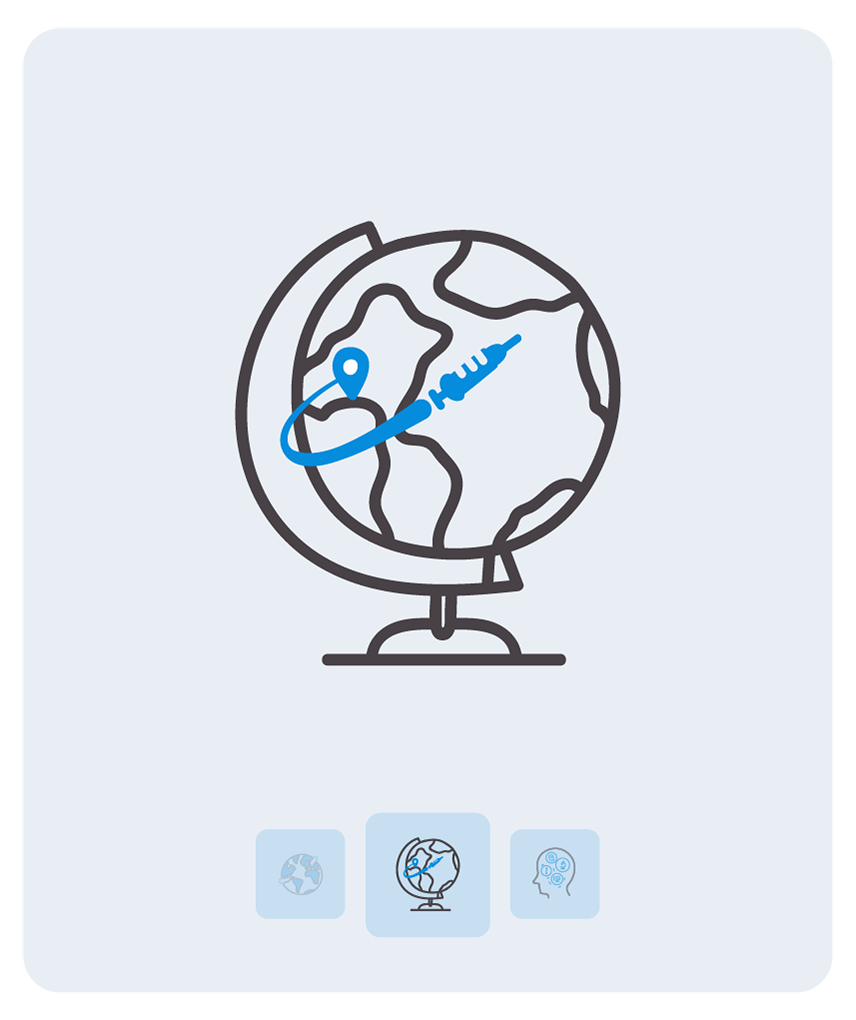International Cooperation for the Future of Pandemic Preparation
Expert analysis on what must come next, and how we can get there.

To understand the major issues and the power urgent international cooperation could exert on the situation, the Wilson Center's Science and Technology Innovation Program and O'Neill Institute present a dynamic video webpage picking apart 8 crucial flash points the pandemic caused, exacerbated, or revealed. Scroll through each of the issue areas to learn from current experts on what agreements, like a pandemic treaty could mean for the future of global health security.


One Health Approach
One Health, the concept, acknowledges that disease and illness spread through the inextricable linkages between humans, animals, and their environments. Global health, the discipline, has long acknowledged this critical interplay between domains– but the urgency of reframing global health with an emphasis on One Health has reached a crescendo over the past decade. Especially in the face of globalization, increased international travel, climate change, and overpopulation, living things are forced to live closer and closer together– giving rise to new and emerging infectious diseases of zoonotic origin. Zoonotic describes a disease that was transmitted from humans to animals or animals to humans.
According to the One Health Commission, “nearly 75 percent of all emerging human infectious diseases in the past three decades originated in animals.” Based on the information available and the current research has corroborated, COVID-19 is zoonotic in origin and provides an extreme example of the pandemic potential of novel infectious diseases. For many years leading up to COVID-19, public health professionals, veterinarians, and researchers who study this human, animal, and environment paradigm have lamented the lack of attention paid to this gap in our global health security.
In May 2021, The Independent Panel for Pandemic Preparedness and Response (IPPR) released a report detailing that sentiment. Lawrence Gostin, Faculty Director of the O’Neill Institute wrote in an article the IPPR reported, “Widespread unpreparedness occurred despite years of unheeded warnings on increased zoonosis and the power of globalization to quickly spread novel pathogens.” This relates to earlier points about surveillance and information sharing since a robust knowledge base of naturally circulating animal viruses would have assisted in the understanding of SARS-CoV-2 earlier in the pandemic.


Disease Surveillance
The origin and discovery of SARS-CoV-2, the virus that causes the disease COVID-19, is the subject of derision within the international community and the relationship between the People’s Republic of China (PRC) and the localities at the center of the initial outbreak. Estimates put the start of the outbreak in November of 2019 with the earliest cases confirmed in early December of that year. These new dates are only after investigations were conducted in the weeks and months after the outbreak was uncovered by the World Health Organization (WHO) on December 31, 2019.
Based on current evidence, the surveillance systems put into place at the local level in China, through their Viral Pneumonia of Unknown Etiology (VPUE) mechanism, and at the international level, through an International Health Regulations mandated network of National Focal Points (NFP) did not meet the moment as they were engineered even though doctors on the ground had begun to raise the alarm.
This also revealed a breakdown in crucial information sharing on the part of the PRC who, it was later revealed, did not alert the WHO but rather was confronted once WHO officials uncovered reports of the novel pathogen on December 31, 2019. It should be noted that surveillance systems, like those in the US, suffered from critical issues with surveillance, data gathering, and testing that set public health responses back during the crucial first months of 2020. Without functioning surveillance systems and robust information sharing between country-specific mechanisms like VPUE and internationally agreed-upon rules, like the use of NFPs, pandemics will continue to seep through countries’ already at-risk public health infrastructure.


Declaration of a PHEIC
A Public Health Emergency of International Concern (PHEIC) was declared on January 30, 2020, by WHO Director-General Tedros. PHEIC declaration is one of the most powerful tools in the arsenal of an organization famously hampered by its lack of codified enforcement mechanisms. Once declared, a PHEIC allows for the distribution of recommendations from the Director-General (DG) that countries are supposed to follow. If member states choose to break from or add to the recommendations there are legal processes they must go through to justify their action.
To declare a PHEIC the DG convenes an Executive Committee (EC) tasked with advising the DG on whether or not the outbreak in question is “an extraordinary event that poses a public health risk to other countries through international spread and that potentially requires a coordinated international response.” After two EC convenings, COVID-19 was declared a PHEIC and was subsequently criticized by many for its tardiness in response to one of the greatest threats to public health in a generation.
Not declaring a PHEIC sooner is argued to have set the international community back from inspiring greater action earlier on in the outbreak. But after the PHEIC was declared, a secondary issue came to the fore: PHEIC declaration incites global panic that does not solely result in strengthening public health infrastructure but instead empowers countries to go against the International Health Regulations (IHR) and hamper pandemic mitigation measures. This is all to say, delaying the declaration of a PHEIC holds the world back from necessary action while the declaration of a PHEIC is an intensely political move that’s implications must be considered and prepared for.


Travel and Trade Issues
National pride and racing to the top of geopolitics are immutable aspects of international relations. A WHO member state is, in theory, required to report a newly detected virus to the correct and functioning surveillance systems set up to prepare for future outbreaks, epidemics, and pandemics. But the reporting often comes at the cost of ostracization by the international community. This is one of the reasons the declaration of a PHEIC was so political. Mara Pillinger wrote in her February 2020 piece for Foreign Policy titled Virus Travel Bans Are Inevitable But Ineffective, once the PHEIC was declared in January 2020 “more than 70 countries responded by imposing travel restrictions against China.”
Global health experts and leaders saw these restrictions as reactionary and many believed they would work against the mitigation of COVID’s spread. The travel restrictions did not stop there– as countries began to close their borders to the world. In the US, there is evidence that the initial travel restrictions did slow the spread, but the time bought did not stop it and if anything provided a false sense of comfort while other public health measures were not taken to prepare for the inevitable.
These travel and trade restrictions disincentivize countries, especially those that rely on others for critical imports and services, from reporting new viruses or variants for fear of retaliation by the international community. South Africa suffered from this when they reported critical data on the Omicron variants to prepare other countries for the impending wave. But they were punished with travel restrictions while other countries with circulating Omicron were not.


WHO Enforcement Mechanisms
Just in this interactive alone, the most glaring issues have somehow implicated the WHO’s lack of powerful authority. For an organization with the leading minds in public health, virology, science communication, and management, the WHO lacks meaningful enforcement mechanisms needed to assure compliance with directives. Beyond its messaging capabilities, its function to champion global health falls at the whim of member states which was starkly illuminated by its delicate and diplomatic dealings with China in the wake of COVID. The WHO’s approach to entering China in February 2020 and February 2021 was met with criticism from a global public wanting an iron fist reaction to China’s stifling of early COVID reports in an attempt to quiet disruption.
But the actions taken by the WHO, up until this point, are in accordance with the IHR. Originally established in 2005, the IHR lacked the support and language to invest authoritative power in the WHO itself. Without that power, countries can easily pick and choose which sections they will abide by understanding that their membership to the WHO and compliance with any of the IHR is sufficient. Sufficient because the WHO would be negligent to kick out or penalize member states when they are all integral to keeping global health security.
That said, there are glaring gaps in the IHR like its text on travel guidance, compliance mechanisms, and surveillance systems that are due for a post-COVID update. Today, we are closer to addressing the needs of a stronger WHO and a more nuanced IHR with the calls for a more robust international agreement or pandemic treaty.


Global Equity
No scholar of history or scholar of public health should have been caught off guard when the early adage of COVID-19 being the great equalizer was not only thrown away but completely reversed. Prior to COVID-19, the most marginalized in society (at the local, national, and global levels) were subject to poorer health outcomes and were more susceptible to economic ruin in the face of medical catastrophes. This can be attributed to the design and zoning of cities, the lack of equitable access to good health care, and the growing chasm between high-income and low-to-middle-income countries when it comes to healthcare resources and technologies.
As predicted, COVID-19 facilitated a furthering of the rift between the resourced and the under-resourced. Women, especially women of color, took on an increasingly disproportionate amount of unpaid labor related to raising a family while also being the backbone of the healthcare workforce. People working for lower wages were frequently unable to work from home like their richer counterparts and also were likely in settings where COVID transmission was heightened. Not to mention, the correlation between many BIPOC communities and the comorbidities associated with pervasive systematic racism forcing communities of color into unhealthy environments.
Even with the news reports highlighting these tragedies that are within our grasp to reverse, the action was not taken to justly accommodate the citizens that need help the most. On an international level, this spans the vaccine-sharing industrial complex and its favoring of rich countries over poor. In the US and elsewhere COVID-19 widened the gap in wealth between the rich and the poor only exacerbating legacy issues and creating a more unequal society.


Vaccine Sharing
Issues related to unequal vaccine sharing and resulting vaccine diplomacy are, like many COVID-19 related problems, based on a lack of preparation married to an international community in crisis and division. On the whole, the vaccines created to combat COVID-19 and its variants have been game-changing technology saving millions of lives and revolutionizing the future of vaccine production. But the distribution of these life-saving serums fell victim to the all too familiar monopolization of health by rich countries mainly in the “global north.”
In preparation for the inevitable, an organization tasked with the ethical distribution of COVID vaccines was set up by the WHO, GAVI the Vaccine Alliance, and The Coalition for Epidemic Preparedness Innovations (CEPI). This new organization, COVAX, is unlike any organization ever created for global health crises. COVAX operates on a complex schema that supports rich countries' vaccine efforts while focusing its distribution arm on divvying up vaccines (donated and purchased) between low to middle-income countries.
Unilateral agreements between rich countries and vaccine manufacturers, a lack of funding, and the inevitable issues embedded in starting an organization in a crisis for a crisis have set COVAX back behind its original goals. It’s worth noting, that COVAX, according to GAVI data reported by Reuters, has delivered 1.61 billion COVID-19 vaccine doses to 146 countries. The future of the organization and its true potential will be critical to the future of COVID-19 variant spread and future pandemics writ large.
Geopolitically, the issue of equitable sharing of vaccines became a diplomatic tool that altered relationships between world powers and their alliances. For example, Russia’s rapid creation and distribution of Sputnik V or Gam-COVID-Vac, their COVID-19 vaccine (touted as the first COVID-19 vaccine), to Southeast Asia, Africa, and elsewhere came under intense scrutiny. But this early action positioned Russia as a major player in not only the race to vaccinate the world but the race to foster goodwill amongst countries without large vaccine manufacturing capacities. China, the US, and many other countries also played a role in this COVID arms race that will take years to fully understand the repercussions of.


New Technologies
As is the case with most systems-based problems, like the spread of a pandemic or climate change, there is no way to just “tech” the problem away. But COVID-19 did provide many entry points where new technology could solve or mitigate a new problem. COVID-19 fast-tracked mRNA vaccine research that was decades in the making. These new vaccine platforms have revolutionized the vaccine creation process and converted crucial lab bench steps to rapid and virtual models.
Other technologies that were created to assist with pandemic mitigation, like the use of surveillance apps, posed a new set of questions for the balancing act between public health and privacy. Different countries adopted different technologies, but most were app-based platforms that tracked users' for reactive reasons (ie exposure notifications) or proactive measures (ie tracking those who should be in quarantine.) Not only were people weary of these new methods of tracking, but the providers of the apps, either government or Big Tech, provided more questions than answers on the future of what effective contract tracing and monitoring could look like if it is marketed or reported as crucial for public health.
All of these technologies will likely last well beyond COVID-19 and re-emerge when new infectious diseases spread. The WHO and international community do have an opportunity to invest or get behind the new technologies that served a public good during the pandemic. But how these technologies are ethically shared, and ethically deployed will likely be a patchwork operation worth tracking now.
If you have any questions or suggested points of collaboration please feel free to contact Alex Long, Senior Program Associate with the Science and Technology Innovation Program, at alex.long@wilsoncenter.org.
The text above was written by Alex with partners at the O’Neill Institute and is not attributed to the experts highlighted throughout the webpage.